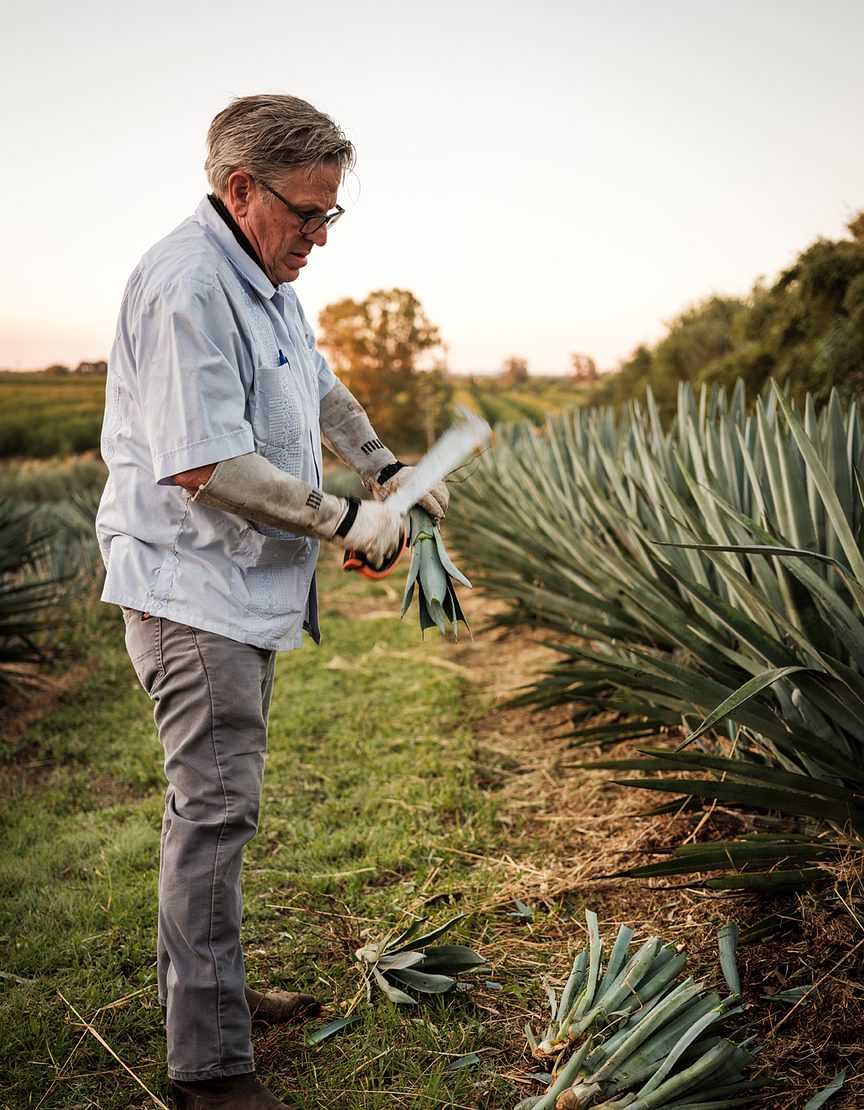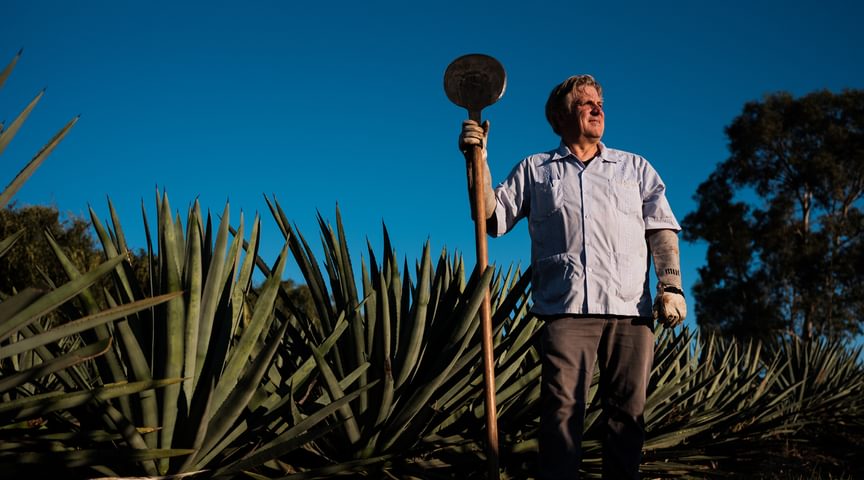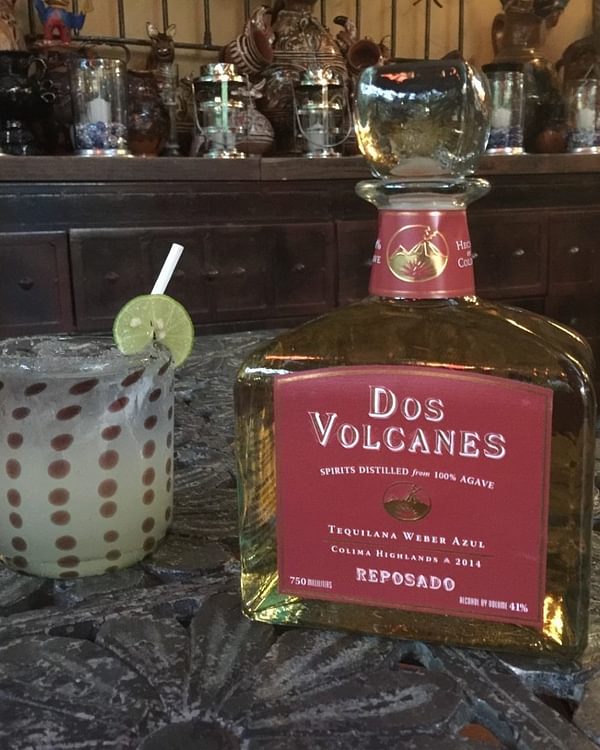
December 03, 2021
Raising spirits
Equal parts non sibi and tequila create Craig Reynolds ’73’s cocktail for changeby Rita Savard
Craig Reynolds’ phone is ringing nonstop these days. Farmers. Distillers. Celebrities. All curious about his crops—rows of prehistoric-looking succulents across a sweeping desert vista in Yolo County, California. Crops that yield one of the most exclusive liquors on the luxury market.
The agave plant is an iconic symbol of the Mexican spirits world, mainly enjoyed in its distilled form as tequila. Reynolds’ own brand of “agave spirits”—Dos Volcanes—is made from the same blue Webber plant as tequila. It began as a whim—an idea dreamed up as a way to raise money for scholarships to support Project Amigo. Since 1984, Reynolds and his wife, Cass, have been volunteers at the nonprofit, which fosters literacy and educational opportunities for underserved children in Colima, Mexico.
“I was certain it would fail,” admits Reynolds, whose day job was working in the California State Legislature as chief of staff for Sen. Lois Wolk. He had zero experience farming or, for that matter, running a business. “But I went along with it to humor my friend, Ted Rose, co-founder of Project Amigo, and surprisingly—to me at least—the agaves did very well.”

His first crop, planted in Colima in 2006, produced 10,000 bottles of Dos Volcanes. The new brand quickly became a critics’ favorite, fetching $70 for a 750 ml. bottle. Proceeds from the sales were poured into the scholarship program that helps send children in rural Colima to high school and college.
A teen from a migrant labor camp named Brenda was one of Dos Volcanes’ first scholars. Her father worked in Mexico’s sugar cane fields and her mother, also a field hand, harvested berries at a local farm. At 17, Brenda was accepted to the University of Colima Medical School—a one-hour bus ride from the camp. She traveled back and forth every day for six years; this past May she graduated as a physician.
“Brenda now serves as a doctor in a nearby village, helping them through the pandemic,” Reynolds says. “There are dozens of stories like hers, made possible by the support of Project Amigo staff, volunteers, and contributors.”
While growing agave in Mexico, Reynolds discovered another way the plant could be useful. His job in politics pushed him deep into the weeds of California’s water policy. Because of climate change, the state is experiencing warmer temperatures, making it the driest it’s been in a century and dropping crucial water sources to their lowest levels.
The science is dire news for everyone, but especially for farmers whose cash crops include almonds and pistachios, which have an insatiable appetite for water.
Ecologically, growing agave can potentially address at least some of the effects of climate change in California, Reynolds explains. The large, spiky bluish-green succulents are naturally drought tolerant, fire resistant and, when compared to other California crops, require less than one-tenth the water to cultivate.
“In other words, it’s a perfect plant,” says Reynolds. “Not to mention that it can grow in places where almost nothing else can grow—like rocky and sandy areas.”
As he forged ahead, trying to carve out solutions for the state’s water shortage, Reynolds would often quip that “the better solution would be for almond growers to grow agave—a high value crop that doesn’t require much water.”
In 2014, the same year he successfully harvested his crop in Mexico, Reynolds planted blue agave north of the border in Yolo County.
“I figured with climate change and the predicted warming, this area would be more and more hospitable,” Reynolds says. “And the world really doesn’t need another tequila from Mexico—there are over 1,500 brands. But California could certainly use at least one.”
The goal isn’t to try and replicate what’s happening in Mexico, but to innovate right here in California.
” Dos Volcanes earned its name from the location of Reynolds’ agave crop in Mexico: between two volcanoes.
Dos Volcanes earned its name from the location of Reynolds’ agave crop in Mexico: between two volcanoes.
Reynolds now has five California craft distillers making spirits from his California-grown agave.
Retired from politics, Reynolds remains an advocate for the environment through a new concept he’s coined “Mezcalifornia” (trademark pending), aimed at building an agave spirits industry in The Golden State that addresses drought, groundwater, and wildfire issues.
The first harvest of his Yolo County crop in 2019 created a media buzz, drawing fans and inquiries from around the globe. In addition to his phone and inbox lighting up with requests—including a publicity campaign for a celebrity tequila on his agave farm and plans for a teaching distillery at UC Davis—some large-scale growers are beginning to take interest.
Getting the big farming operations on board, Reynolds points out, is the only way for agave to have a fighting chance to create real and lasting environmental change. And whatever emerges on this side of the border for agave will be something new in both name and spirit.
“I’m focused on nurturing the industry through its infancy, getting more growers and craft distillers on board and connecting them,” Reynolds says, adding that he is now working with one of the largest growers in the region, which recently planted an experimental crop of agave. “The goal isn’t to try and replicate what’s happening in Mexico, but to innovate right here in California.”
Other Stories

Best-selling author Rachel Howzell Hall delivers MLK Day keynote




